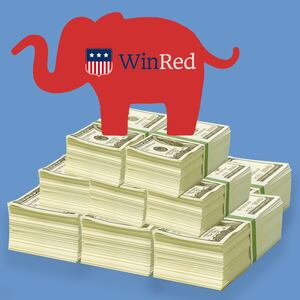Democratic fundraising giant ActBlue says it raised more than $305 million in the third quarter, more than tripling its totals over the same period in 2017, the most recent comparable election cycle, according to documents first obtained by The Daily Beast.
The internal data shared with The Daily Beast shows the Democratic money machine marked dramatic increases across the board. Raw totals of donors and contributions both more than doubled over this point in the previous midterm cycle, as did the amount of cash funneled to Democratic House and Senate candidates, many of whom face tight races in 2022.
That $305 million came from 2 million individual contributors, with an average donation amount of $35.26. And the combination of gifts to outside groups and to candidates at the federal, state, and local levels brings ActBlue’s sitewide totals on the year to an eye-popping $906 million.
ADVERTISEMENT
ActBlue executive director Erin Hill provided a statement touting the platform’s responsiveness.
“Grassroots donors are not letting up the gas pedal as we head into 2022,” Hill said. “This quarter particularly showed that donors are ready to mobilize at a moment’s notice and committed to supporting candidates and causes long-term. As donors fuel movements and expand their investment in campaigns and organizations demanding change, they’re setting the stage for the pivotal midterm year.”
In Q3 of 2020—a record-busting year—ActBlue pulled in $1.5 billion. And while midterms don’t carry the same high stakes, it appears Democratic candidates have found their fundraising footing, even without President Donald Trump in the White House as a foil.
Still, Democrats have a daunting task ahead of them to keep the House of Representatives, with Republicans redistricting enough seats that they should start the midterms at a small advantage, even though Democrats currently hold the House by four seats.
Democrats also hold the Senate with a 50-50 split and Vice President Kamala Harris providing the tie-breaking vote. But the map for who’s up in the Senate should slightly benefit Democrats, as two GOP incumbents in purple states—Richard Burr (R-NC) and Pat Toomey (R-PA)—aren’t running for re-election, and Democrats are hopeful about turning seats like Ron Johnson’s in Wisconsin.
Campaign finance reports filed over the last week show both parties have already raised a staggering amount of money, with even House candidates regularly turning in million-dollar quarterly sums. The two party committees dedicated to re-electing members of the House have accumulated a combined $128 million this year, according to the federal filings.
But ActBlue’s numbers indicate that Democrats are activated at the state and local levels as well, nearly tripling its receipts in gubernatorial and state legislative contests alike over 2017.
Gubernatorial races in particular have attracted donors. ActBlue recorded triple the amount of contributors to those races over Q3 2017, distributing tens of millions of dollars to Democratic candidates in Virginia and New Jersey, and to defending the GOP effort to recall California’s Democratic governor Gavin Newsom, which failed last month. Virginia’s Democratic gubernatorial candidate Terry McAuliffe, who finds himself neck-and-neck with GOP challenger Glenn Youngkin, has posted more than $30 million overall, including his ActBlue receipts.
Democrats are starting to fill war chests on an even more granular level, however, indicating grassroots activism efforts have found traction. ActBlue says it nearly tripled what it raised for state attorneys general candidates compared to the same period in 2017, and about three in four of those donors had never given to a state AG through ActBlue.
And as Republicans focus on election administration in the wake of state-level challenges to the 2020 election, ActBlue’s data evinces a Democratic response—pulling in more than five times the amount raised for secretary of state candidates in Q3 2017.
But like WinRed, ActBlue relies heavily on recurring small-dollar contributions. After the 2020 fundraising bonanza, that practice came under scrutiny from attorneys general in several states. And while the number of ActBlue donors more than doubled over Q3 2017, the average contribution amount appears more or less equal, about $35 to $34.
This quarter, recurring donations accounted for about $57 million of ActBlue’s receipts—about 20 percent.








